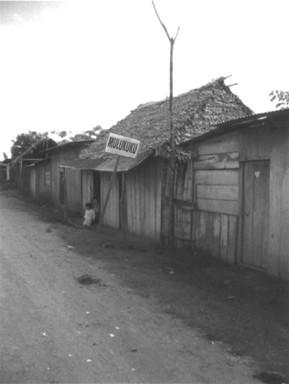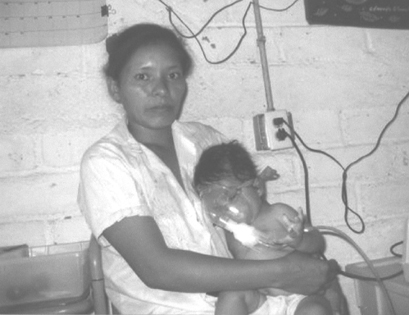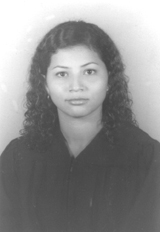In this Summer 2003 edition
of ¡Abrazos! de Mulukukú you
will find,
A letter from Dorothy;
News Update from WEN;
Note on Donations;
Leaving a Legacy;
Dorothy's Upcoming Tour.
[Photos have been reduced in size. You may view
them full size by simply clicking on them.]

WITH
“A WHOLE HEART”
WE
WILL PREVAIL
Warmest
greetings to each of you,
 write from Santa Cruz, California. Doctors for Global
write from Santa Cruz, California. Doctors for Global
|
|
|
Portland Naturopathic Delegation:
"Here we see our philosophy in action."
Photo provided by Taatha Parker
|
Health (DGH), a group of progressive physicians and other health workers,
invited me to speak at their annual assembly last weekend. This trip has
allowed me to meet with our support group, the Women's Empowerment Network,
and many others.
THE MAKING OF WAR
At the time of our last newsletter, the U.S.
government was threatening to invade Iraq, a small country that allegedly
possessed weapons of mass destruction, that posed a threat to the security
of the United States. The invasion was carried out with massive loss
of life and creating what may become another Vietnam. In the wake
of the invasion, human and civil rights are being violated in the interests
of national security. Equally shocking are reports that the attack
of September 11 on the World Trade Center may have been preventable.
Many of my co-workers in Mulukukú are
losing hope for the future as the U.S. wages war at will and neoliberal
economics with its executioner, structural adjustment, continues to squeeze
the life out of the poor by preventable disease, hunger, violence, and
neglect.
THE MAKING OF PEACE
In the face of this grim reality, there is
another reality. I came away from the Doctors for Global Health gathering
filled with hope for a better future, inspired by the 300 health workers,
students and activists. With their belief that access to basic health care
is a human right, DGH works in Chiapas, Mexico, Guatemala, El Salvador,
Nicaragua and Uganda. These people are making peace with a whole
heart using their skills and ideals to accompany and serve the poor.
For the last two years, DGH has sent several volunteer physicians
and a nurse to help us in the clinic.
Other signs of hope in the U.S. are the strengthening
of groups and the creation of others saying no to war-making and assaults
on civil and human rights. I believe the majority of people in this
country want a peaceful world and need only to be awakened to what is being
done in their name.
NICARAGUA NEWS
Autonomy legislation for the Atlantic Coast:
The  National
Assembly finally passed legislation to enforce the Autonomy Law of the
Atlantic Coast, enacted in 1987 by the Sandinista government, giving local
control over natural resources and institutions. (Mulukukú is in
the North Atlantic Autonomous Region, RAAN.) Since 1990 the central
government has largely ignored the Autonomy Law by giving concessions of
natural resources to private companies as well as permission to individuals
to occupy and even sell indigenous peoples? land. U.S. citizen Peter
Tsokos has been selling indigenous-owned islands on the Internet.
National
Assembly finally passed legislation to enforce the Autonomy Law of the
Atlantic Coast, enacted in 1987 by the Sandinista government, giving local
control over natural resources and institutions. (Mulukukú is in
the North Atlantic Autonomous Region, RAAN.) Since 1990 the central
government has largely ignored the Autonomy Law by giving concessions of
natural resources to private companies as well as permission to individuals
to occupy and even sell indigenous peoples? land. U.S. citizen Peter
Tsokos has been selling indigenous-owned islands on the Internet.
Privatization is back-firing: In Managua,
protests mount as more people are unable to pay the rising costs of electricity
charged by the Spanish company, Union Fenosa. The International Monetary
Fund (IMF) has demanded that all Nicaraguan government services be sold
to private companies. There is also strong resistance to the impending
privatization of water, the last major public service to go into private
hands.
The Central American Free Trade Agreement
(CAFTA) is being negotiated. CAFTA would remove tariffs of goods
coming into Nicaragua, undermine agricultural and other production, and
destroy workers? ability to organize by establishing more Free Trade Zones.
NAFTA (North American Free Trade Agreement), the predecessor of CAFTA,
has been in operation in Canada, U.S. and Mexico since January 1994.
The Nicaragua Network Monitor of April 2003: Since NAFTA, more than 700,000
decent-paying jobs have been lost in the U.S. During this same period
(1996 to 2003), the percentage of Mexicans living in poverty has risen
from 58.5% to 79%.
NATIONAL ASSEMBLY
RECOGNITION
At the end of May, the Nicaraguan National
Assembly recognized our contribution to the health of the people and especially
of women. A plaque was presented to me and three other women.
We see this as an affirmation by the country’s highest legislative body
of women’s right to health, the right of people to organize to meet their
needs and a welcoming to non-governmental groups and foreign volunteers.
A negative note was the exodus of a group of legislators who continue to
staunchly support former president Alemán. (p.s. from WEN: This
is only two and one-half years since the government pad-locked the clinic
and tried to deport Dorothy – now a national award! Hope springs eternal!)
GALVESTON MEDICAL-DENTAL
DELEGATION’S 7th YEAR
A group of 53 physicians, dentists, medical
students, nurses, translators and helpers worked extraordinarily hard and
in 11 days served 2,242 people. There were 24 referrals to hospitals, including
several emergencies. Our new Toyota Land Cruiser (a 1996 model made
possible through a generous friend) was on the road day and night taking
patients to the government Health Center in Rio Blanco and to hospitals
in Managua.
DEFENSE OF CHILDREN
AND WOMEN:
| INTERVENTION
FOR: |
WOMEN/ADOLESCENTS |
GIRLS |
BOYS |
SEXUAL CRIMES
PSYCHOLOGICAL MALTREATMENT
CHILD SUPPORT
PROPERTY DISPUTES
MEDIATION
TOTAL: |
117
602
720
150
302
1,891 |
241
241
482 |
15
15
30 |
|
Some of the emergencies: a 40-year-old woman
with acute cerebral malaria and a hematocrit of 10; a 23-year-old man who
fell asleep on top of a bus, fell off, and laid unconscious in the mud
and rain for several hours with a fractured skull and an absence of reflexes
in his lower extremities; a 4-day-old infant with a life-threatening heart
defect; a 41-year-old man with an intestinal obstruction who just made
it to an operating room; a 60-year-old woman with diabetes in acute congestive
heart failure; a woman about 30 found wandering on a road with acute psychosis;
a 20-year-old man with a .38- calibre bullet lodged in his skull between
the eyes. Two hospitals tried to refuse admission to some of the patients.
Several patients stayed one or more nights in the clinic receiving intravenous
fluids, oxygen and medicines. With good physicians and adequate equipment
and medicines, the care in our small clinic was superior to what could
have been received in some public hospitals. We are a primary care
clinic dependent on a health system, but the system is disappearing.
JANUARY 1 TO JULY 1, 2003
REPORT
CLINIC:
WOMEN:
MEN:
DENTAL:
CHILDREN:
TOTAL SERVED: |
4,234
778
998
2.255
8,265 |
1,100 Paps were taken
and follow-up done
|
Someone who we didn’t have time to send to
hospital
because there was no time: an overweight woman in labor with her 7th child.
She came to the clinic with toxemia, diabetes and a completely dilated
cervix. After struggling to control her blood sugar and blood pressure,
and with the infant’s head partially out, contractions stopped and so did
fetal heart tones. It took several people to pull the dead baby out.
The infant weighed over 12 pounds. Experienced physicians cried and
medical students couldn’t even speak. The next morning, the patient,
Fatima, was comforted by her family and began her recovery.
MARIA DE JESUS
A year and a half ago we visited communities
in the mountains at the head of the Umbla River to provide health care.
We were taken to Maria de Jesus who lived with her companion and 6 children
in a small house made of bamboo and thatch with a dirt floor. She
was gravely ill and didn’t have the strength to move from her hammock.
Maria’s skin was covered with infected cockroach bites. We took her
to our clinic in Mulukukú. Maria had malaria, tuberculosis
and syphilis. While she was healing, we learned that Maria had been beaten
by her companion. When she became ill, he did not give her food or
seek health care. We also learned that her 10-year-old daughter had
been raped by her step-father. The child also had syphilis.
WOMEN'S AND
CHILDREN'S
SAFE HOUSE:
JANUARY 1 - JULY 1,
2003
TOTAL: 32
|
Maria de Jesus has healed. With a small loan
she supports her family, and the children are in school. Her former
companion is in prison.
Highlights This Year So Far:
January: Medical-Dental delegation from Manchester College, Manchester,
Indiana for the 11th year serving 2,234 people. Report in Newsletter
#29. Collaboration began with the Central American Health Institute
for cervical cancer screening and treatment for women 25 years and older.
February: American Jewish World Service (AJWS) sent a 12 member
group of Canadian university students who prepared earth for the medicinal
plant garden. Report in Newsletter #29. DGH volunteer nurse, Jennifer
Perry, served for two months.
March: Volunteer Christy Cook, midwife and computer expert, helped
with births, programmed the clinic computer and trained a staff member
in data entry, serving for three months. DGH volunteer Family Practice
physician, Jason Aurremia, served for a month.
April: Dorothy visited Albuquerque, Kansas City, and Chicago
for a brief speaking and fund-raising tour.
May: Volunteer family practice physician Constance Adler and
pediatrician Iris Silverstein served for two weeks. Toyota truck purchased
at Peace Corps auction.
June: Galveston delegation visits for 7th year. Nicaraguan
 |
| Dr. Amoretti |
physician, Carolina Amoretti, joined staff. She’ll be in Mulukukú
for three weeks of every month.
July: Fourteen students and faculty from the National College
of Naturopathic Medicine in Portland, Oregon, made a brief visit. We discovered
a wonderful commonality of health philosophy, and we look forward to collaborating
in the future.
Friends, thank you for your continued support of our shared
| “We have assumed
the name of peacemakers, but we have been, by and large, unwilling to pay
any significant price.
“And because we want the peace
with half a heart and half a life and will, the war, of course, continues,
because the waging of war, by its nature, is total – but the waging of
peace, by our own cowardice, is partial. So a whole will and a whole
heart and a whole national life bent toward war prevail over the mere desire
for peace. There is no peace because the making of peace is at least as
costly as the making of war – at least as exigent, at least as disruptive,
at least as liable to bring disgrace and prison and death in its
wake.”
–Dan Berrigan
|
work. We try to use your donations carefully and work as hard
and as well as we can. This work was begun more than 13 years ago
to serve the reproductive health needs of campesinas. During this
time we have witnessed the deterioration of the beautiful health system
that the Sandinista government created and the increasing crises of the
health of the poor as resources are taken from health to service the nation’s
debt. Initially, the work of the clinic was to help people improve
their health. Increasingly, our intervention is the difference between
life and death of many of the poorest of the poor.
I implore you to look deeply into yourself
and discover your strength, talents and compassion and put them to work
– with a whole heart and will – to make this a more peaceful and just world
where rights are honored and
where no child dies of war or neglect.
Abrazos from your friends in Mulukukú,


News Update from WEN: In mid-August, former president Arnoldo Alemán
was moved from house arrest at his luxurious ranch to a private cell in
a Managua police prison to await trial on charges by Nicaragua’s attorney
general that he and more than 40 members of his family and former administration
diverted $100 million of public funds for personal use. He may also face
trial in the U.S. on charges of money-laundering having allegedly used
U.S. as well as Panamanian banks in the operation, according to the BBC
News. Criminal Judge Juana Mendez said financial problems meant police
were struggling to provide the 20 guards assigned to ensure Mr. Alemán
remained on his property.
A note on donations: Last year at this time, with a drop in
the U.S. economy, donations fell, and the clinic faced a financial emergency.
Staff positions were cut to half-time, programs were put on hold, and WEN
went into overdrive on fundraising. AND YOU, whom we called upon, showed
that you do consider yourself true partners in this effort, and you gave
what was needed to put the clinic back on track. We hope you can help this
year’s income be more steady. We are moved by how you watch over
the clinic’s needs and how ready you are to respond. You may continue
to help us through the convenience of your credit or debit card through
our secure PayPal system. Just click on the button below:
–Janie Yett, Board President
Leaving a legacy: Many of you may be interested in sustaining the
clinic for the long haul. We plan to provide more information early next
year regarding leaving a charitable gift in your will or living trust,
among other options.
–Jill Winegardner, Board Secretary
For information on Dorothy’s September 18 to October 23 East Coast tour,
contact Christy Cook.

If you would like to share your experiences in
future newsletters, please contact Ellen Farmer at our email address.
For those of you would like to receive the
newsletter in the mail, please write to us at:
wempowermentn@yahoo.com
You can also alert your email-loving friends to
check out the website.

|
|
Several colorful murals now adorn the walls of the
clinic in Mulukukú. These murals, painted by Nicaraguan college
students this year, were funded by an anonymous donor from the states who
wants the clinic's influence to continue through upcoming generations.
|
Stay strong! Keep the faith. And PEACE,
The WEN board,
Janie, Jill
& Kaki, Women’s
Empowerment
Network,
Santa Cruz, California



Women’s Empowerment Network
309 Cedar Street, #547
Santa Cruz, CA 95060
Tax ID 77-0566997
¡Abrazos! de Mulukukú Archived:
Fall, 2002
Summer, 2002
Spring, 2003 |


 |

